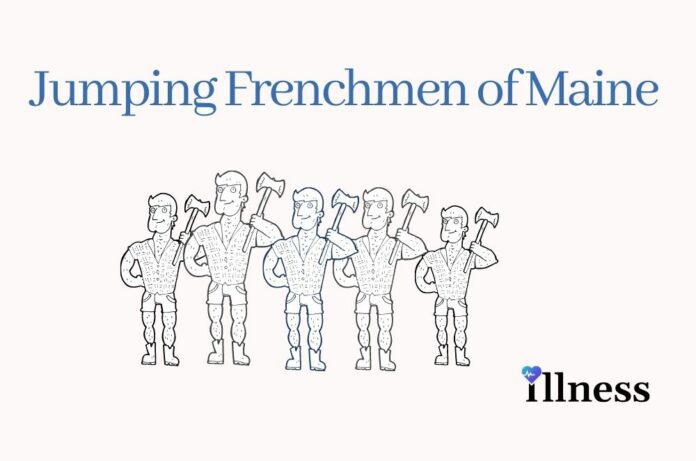Overview
Jumping Frenchmen of Maine is a condition characterized by an unusually extreme startle response. The exact cause of the condition is unknown. One theory is that the disorder occurs because of an extreme conditioned response to a particular situation influenced by cultural factors. It was first identified during the late nineteenth century in Maine and the Canadian province of Quebec in an isolated population of lumberjacks of French Canadian descent. Jumping Frenchmen of Maine is a type of startle-matching syndrome. These syndromes have been described in many different parts of the world.
Cause
Although the exact cause of jumping Frenchmen of Maine is unknown, it is believed to be a neuropsychiatric disorder. The startle reaction is a normal human response to sudden or unexpected noise or movement. However, in individuals with jumping Frenchmen of Maine, the reaction is exaggerated or abnormal.
Because so few cases of jumping Frenchmen of Maine have been reported and no detailed studies have been conducted, the exact cause(s) and underlying mechanisms of this and similar disorders are unknown. It is possible that both genetic and environmental factors may play a role in the development of these types of disorders.
A few theories have been proposed to explain the development of jumping Frenchmen of Maine. One theory suggests that such disorders are behavioral disorders that develop due to culturally-specific operant conditioning. Operant conditioning is a method of learning a behavior-based upon rewards and punishment. An example of operant conditioning is children who learn that they will not able to play until after completing their homework. In such cases, the underlying reasons why individuals develop the exaggerated startle reflect that characterizes the disorder is unknown.
However, some researchers believe that jumping Frenchmen of Maine may be a somatic neurological disorder. A somatic disorder is caused by a gene mutation that occurs after fertilization and is not inherited from the parents or passed on to children. Cultural influences would mediate the severity and expression of such a disorder in individual cases.
More research is necessary to determine the exact causes(s) and underlying mechanisms involved in jumping Frenchmen of Maine and related culturally-specific startle disorders.
Symptoms
The symptoms of jumping Frenchmen of Maine usually begin after puberty or during the teenage years. Individuals affected by this disorder display an abnormal and exaggerated startle reaction consisting of jumping, screaming, flailing the arms, hitting, or throwing objects.
A startle reaction is caused by sudden or unexpected stimuli such as loud or unexpected noises, a sudden command or gesture, or unexpected physical contact such as a sudden poke in the ribs. Following the startle reaction, affected individuals may repeat back words or phrases in a parrot-like manner (echolalia) and they may involuntarily mimic or imitate movements or gestures (echopraxia). Some affected individuals may involuntarily swear or utter obscene or socially inappropriate words or phrases (coprolalia). In addition, some affected individuals may exhibit automatic or “forced” obedience after a startle response during which they automatically respond to simple commands such as jump, run or hit. Normally, these individuals would not respond to such commands.
In most cases, the symptoms lessened in frequency and severity as affected individuals grew older. The intensity of the startle response may be affected by the frequency of being startled as well as fatigue, stress or emotional tension. An affected individual must be startled in order to elicit the reaction. Jumping Frenchmen of Maine can dramatically impact daily life because of the inability to control or mediate stimuli in the course of one’s day. Individuals with jumping Frenchmen of Maine were often teased deliberately causing an increase in the frequency and severity of the episodes. Usually, the more frequently an individual is startled, the more severe and stereotyped is the response.
Treatment
There is no specific therapy for individuals with jumping Frenchmen of Maine. Eliminating the practice of intentionally startling and/or teasing an individual so as to cause a jumping response can help to reduce or end episodes.
Symptoms tend to get milder with age, but more intense with stress or anxiety. In the reported cases, startle episodes corresponded with stressful situations such as the start of work as a lumberjack. When affected individuals left the lumberjack camp the disorder lessened in both severity and frequency.
Other
Symptoms of the following disorders can be similar to those of jumping Frenchmen of Maine. Comparisons may be useful for a differential diagnosis.
Hyperexplexia, also known as Kok disease, is a rare, hereditary, neurological disorder that may affect infants as newborns (neonatal) or prior to birth (in utero). It may also affect children and adults. Individuals with this disorder have an excessive startle reaction to sudden unexpected noise, movement, or touch. Symptoms include extreme muscle tension (stiffness or hypertonia) that can cause the affected person to fall stiffly, like a log, without loss of consciousness. Exaggeration of reflexes (hyperreflexia) and an unstable way of walking (gait) may also occur. The treatment of hyperexplexia is relatively uncomplicated and involves the use of anti-anxiety and anti-spastic medicines. Because the disorder is frequently misdiagnosed as a form of epilepsy, the process of getting an accurate diagnosis may be prolonged. (For more information on this disorder, choose “hyperexplexia” as your search term in the Rare Disease Database.)
Tourette syndrome is a neurologic movement disorder that is characterized by repetitive motor and vocal tics. The first symptoms that usually occur during childhood are rapid eye blinking or facial grimaces. Symptoms may also include involuntary movements of the extremities, shoulders, face, and voluntary muscles. Some people with Tourette syndrome may vocalize involuntarily; these may be inarticulate sounds or words. Tourette syndrome is not a progressive or degenerative disorder; symptoms tend to be variable and follow a chronic waxing and waning course. Onset usually occurs before the age of 16.
Source
https://rarediseases.info.nih.gov/diseases/6803/jumping-frenchmen-of-maine
https://rarediseases.org/rare-diseases/jumping-frenchmen-of-maine/



